Summarize this article via
Managing social media today means more than just scheduling posts—it’s about engaging customers in real time, tracking competitors, and analyzing performance across multiple platforms. To do this efficiently, businesses need a reliable social media management tool.
Sprout Social is one of the most recognized platforms in this space, offering publishing, engagement, analytics, and even advanced features like employee advocacy and influencer management. It has over 5,000 reviews on G2 with a 4.5-star rating, praised for its ease of use, post scheduling, and comprehensive reporting.
However, Sprout comes with significant downsides. Its pricing starts at $199 per user per month for 5 social profiles, and the most popular plan costs $299 per seat—a model that can quickly become expensive for growing teams or agencies managing multiple accounts. Many users also point to missing or limited features relative to the cost, occasional platform linking issues, and a steep learning curve for smaller businesses.
That’s why many companies are looking for Sprout Social alternatives—social media analytics tools that provide robust scheduling, analytics, competitor tracking, and social listening without the enterprise-level price tag.
In this article, we’ll explore the top 6 Sprout Social alternatives for teams in 2025, highlighting tools that balance affordability, scalability, and performance for businesses managing 3–5 (or more) social accounts across platforms like Facebook, Instagram, TikTok, LinkedIn, and YouTube.
Top 6 Sprout Social alternatives
TL;DR:
- Sociality.io – Best overall for Social Inbox, Publishing, Tracking Competitors and social listening.
- Buffer & Metricool – Best for content creators.
- Metricool – Best budget option for publishing and ad management.
1- Sociality.io: Everything teams need for social media management
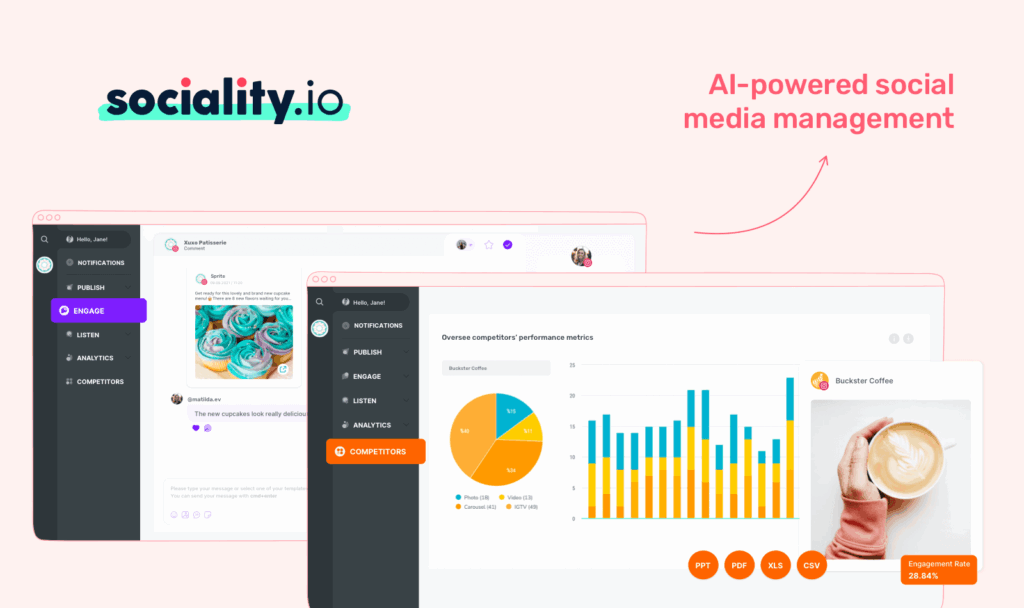
Sociality.io is an all-in-one social media management platform based in the UK. It started in 2015 and has customers across 30+ countries from all sizes. Sociality.io has a great UX, easy to use and onboard. Here are the main features of Sociality.io as a summary:
- Schedule and publish on social media
- Engage and reply with unified social inbox
- Measure social media account performance
- Listen social media & web
- Track competitor performance on social media
Now, let’s dive into the features of Sociality.io:
Analytics: Measure social media performance with ease
The Analytics module helps your team track, measure, and understand performance across all your social media accounts in one place. From post-level insights to cross-channel comparisons, Sociality.io provides everything you need to build data-driven strategies without leaving the dashboard.
- Track account growth, engagement, reach, and impressions across platforms like Instagram, TikTok, Facebook, LinkedIn, and more
- Dive into individual post and campaign performance
- Compare organic vs. paid results on Instagram
- Access TikTok analytics to understand video performance and identify trends
- Export reports in PDF, PPT, or Excel to share with stakeholders
- Access historical data to spot long-term patterns
Publish: Schedule social media content ahead and publish automatically to social media.
Sociality.io helps you to schedule your social media content on Instagram, Facebook, Youtube, LinkedIn and TikTok. By using the publishing feature, your team can plan your social media content ahead of time and not have the hustle to publish to different social media channels at the same time. Beyond that, your team can share internal feedback and review social media content before it’s published, share content for reviews, and build a smooth workflow.
- Schedule text, visual and video content
- Add internal notes to content for revisions
- Approval workflow
- Team logs
Engage: Manage accounts and reply from one, unified inbox
The Engage feature is one of the core reasons why Sociality.io stands out as the best alternative to Sprout Social. Designed with customer experience teams in mind, it allows you to manage conversations across all social platforms from a single, streamlined dashboard—delivering everything Sprout offers, and more.
This is critical because nearly 79% expect one within 24 hours (HubSpot). Failing to meet those expectations risks churn, as over 50% of consumers switch brands after just one poor experience (Zendesk, 2025).
- Sentiment analysis & Message Ttagging
- Tag coworker to conversations
- Permission & Role management
- Customer profile information
- Team performance reports
- Competitor analysis
Competitor analysis: Track competitor performance on social media
The next popular module of Sociality.io that makes it the best alternative to Sprout is the Competitor Analysis module. After adding all of the competitor brand accounts for each social media channel, users can start using the competitor analysis module easily.
-
Track social media posts of competitors
-
Filter by engagement, post type and analyze hashtags
-
View post hours & Post days of competitors
-
Historical data access (Up to 2 years)
-
Scheduled reporting
-
Post-level performance metrics (Total interactions, performance, organic and paid posts, likes, comments, engagement rates)
Social & web listening: Listen conversations by keywords and hashtags
Social Listening is one of the key reasons people often compare Sociality.io to Sprout Social—and why many find it a strong alternative. With Sociality.io, you can keep track of what people are saying about your brand across the internet, including social media platforms, forums, and even news sites.
- Track brand mentions across different sources
- AI-powered sentiment
- Catch both direct and indirect mentions
- Support for hundreds of languages
- Custom alerts
- AI-powered & Manual tagging
- Quick summaries
- Powerpoint, PDF and Excel export
- Security+ (2FA, user logs, allowed IP’s, password rules)
Sociality.io pricing
Sociality.io offers pricing starting at just $99, based on the number of social media accounts you manage and engage with. Calculating the pricing of Sociality.io for your brand is easy; just take a look at the pricing page.
Sociality.io G2 reviews
Sociality.io has 5 stars on G2.com and stands out as a comprehensive platform that meets users’ expectations in the field of social media management. Users express satisfaction with the service due to its ability to automate reporting processes and provide easy-to-understand reports. The ability to manage the content calendar and monitor social media interactions from a single panel offers significant advantages to users.

Additionally, the social listening and competitor analysis modules help users effectively understand their brand purpose, create social media strategies and gather social insights. When it comes to managing social media accounts and measuring performance, users also highlight the convenience provided by Sociality.io. Overall, Sociality.io is considered an essential tool for social media management.
Sociality.io vs Sprout
Sociality.io provides the same feature set and is very easy to use, just like Sprout Social. Unlike Sprout Social—whose plans start at $199 per seat—Sociality.io’s business plans include unlimited seats, making it ideal for teams of all sizes.
Also, many of our users who switched from other social media tools to Sociality.io highlight that it helps them speed up their processes, especially in community management as Manuel Malavenda from [comfort zone] highlights.
If you want to learn more about how Sociality.io helped [ comfort zone ], here’s the full story!
And if you want to speed up your processes, start your 14-day-trial now.
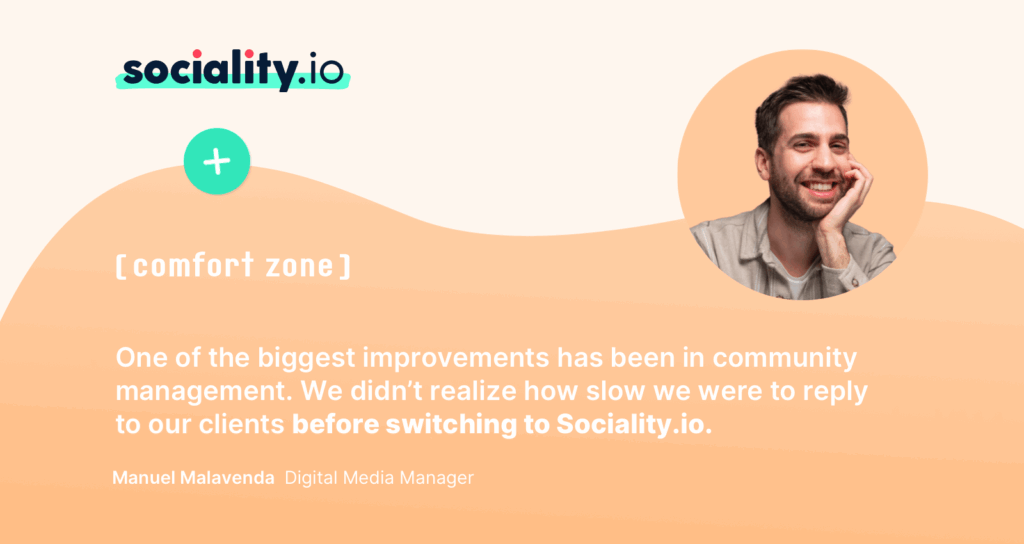
2- Alternative to Sprout Social: Buffer
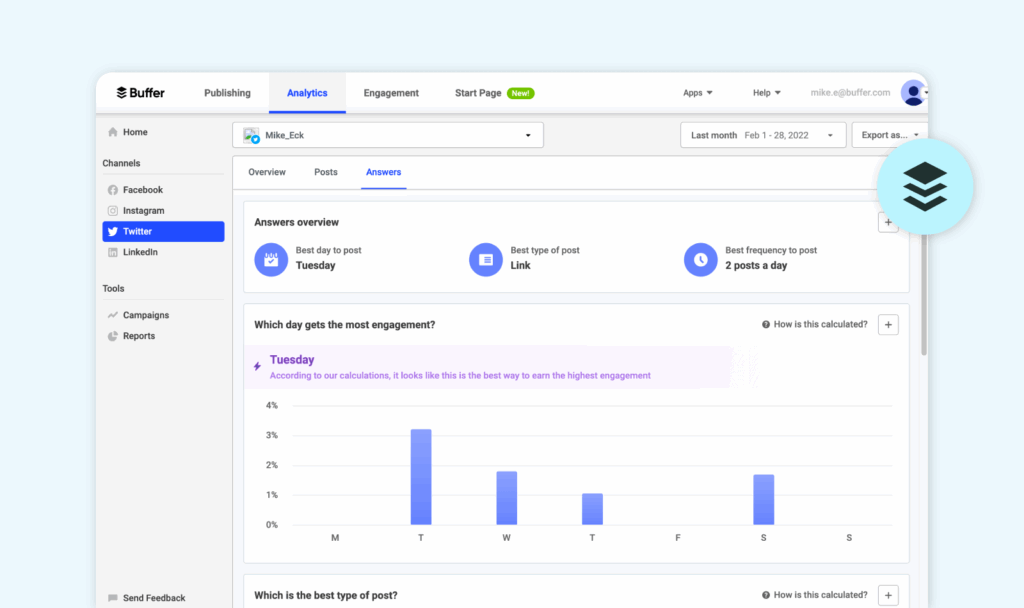
Started in 2010, in California, Buffer is one of the popular social media management tools. It is a solid choice for creators and small businesses focused mainly on content publishing and audience engagement. It shines with features like unlimited scheduling, automated posting, and an AI Assistant that helps craft engaging content. The “Engage” feature lets users manage all DMs, mentions, and comments in one place, streamlining communication much like Sprout Social’s inbox. Buffer also offers clear and straightforward analytics with automated reporting, making it easy to track performance without overwhelming complexity.
Buffer’s pricing
Buffer offers a free plan for up to 3 social channels. For larger teams, paid plans start at $10 per channel. So, managing around 5 social media channels for publishing and engagement would cost approximately $50 per month.
Summary: Buffer vs Sprout Social
Unlike platforms like Sprout Social or Sociality.io, Buffer lacks social listening, competitor tracking, and advanced security features. This makes it better suited for teams that prioritize publishing and interaction rather than full-scale brand monitoring, competitor analysis or enterprise-level control. Its simplicity, affordability, and collaborative tools make it an efficient pick for smaller-scale operations.
3- Alternative to Sprout Social: Metricool
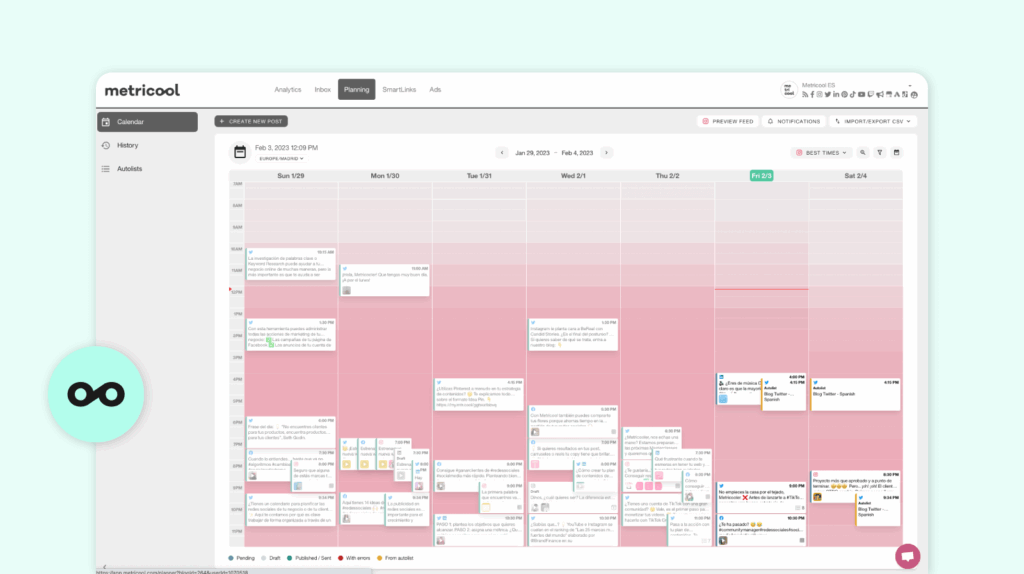
Founded in Spain in 2015, Metricool has grown into a versatile social media management and analytics tool used by marketers, agencies, and freelancers. It’s especially well-suited for users who want a blend of content planning, competitive analysis, and in-depth reporting in one unified platform. Metricool stands out with its visual content calendar, auto-publishing, and the ability to manage both social media and ad campaigns (Google ads, Facebook ads etc.) from a single dashboard.
Metricool pricing
Metricool’s pricing is from $18 to $45, it’s great for small teams and freelancers who need to publish content and manage Google and Facebook ads.
Summary: Sprout Social vs Metricool
When it comes to comparison, we may say Sprout and Metricool are on different paths. Sprout is focused on social media management, analysis and influencer marketing but Metricool is mostly focused on content publishing and ad management.
4- Alternative to Sprout Social: Sendible
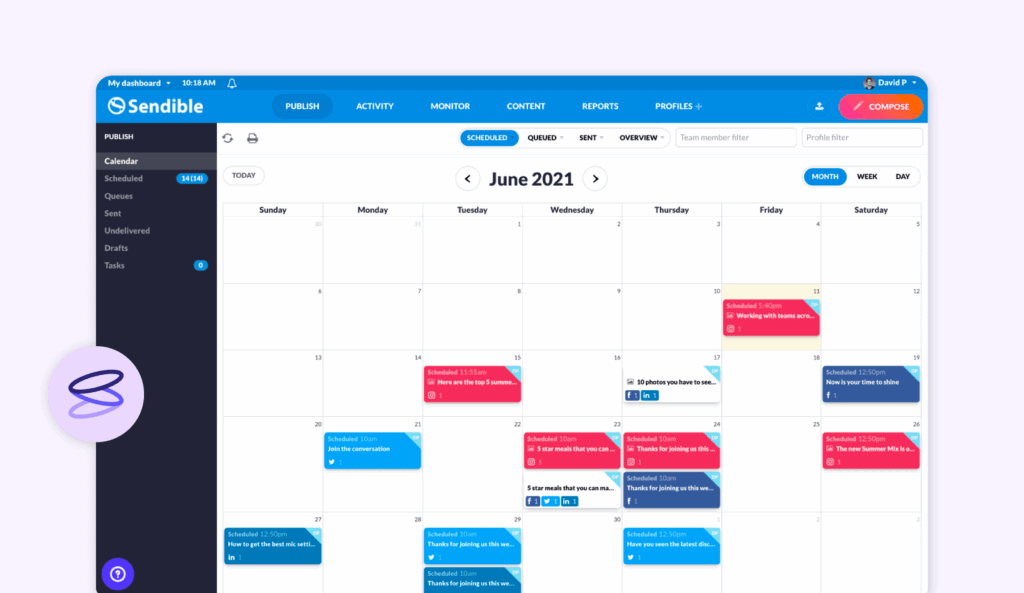
Founded in the UK in 2009, Sendible is a powerful social media management platform designed primarily for agencies and growing businesses managing multiple clients. It offers a well-rounded feature set that includes content scheduling, social inbox management, and in-depth analytics, all wrapped in a clean, customizable interface.
One of Sendible’s standout features is its priority inbox, which consolidates all social interactions—comments, mentions, and messages—across platforms for efficient engagement. The platform also provides a visual content calendar, bulk scheduling, approval workflows, and integration with tools like Canva and Google Drive, making it highly collaborative for teams. But that’s what we call the basics of social media management, right?
Sendible supports a wide range of networks, including less-common ones like Google Business Profiles and WordPress, and allows white-labeling—a huge plus for agencies looking to deliver branded reports and dashboards to clients.
Overall, Sendible is a strong alternative to Sprout Social, particularly for agencies and service providers looking for a scalable, client-focused tool with collaboration, reporting, and publishing automation at its core.
Sendible pricing
Sendible offers five pricing tiers to suit different user needs—from solo creators to large enterprises. Plans start at $29/month for individuals and scale up to $750/month or more for enterprise-level teams.
Summary: Sendible vs Sprout Social
Sendible focuses heavily on publishing, scheduling, and collaborative content creation, making it a solid tool for agencies and teams managing multiple clients. While its pricing is comparable to Sprout Social, it lacks advanced features like competitor analysis and social listening, which are critical for comprehensive social media strategy. Considering these gaps, Sociality.io remains a stronger alternative to Sprout for users seeking a more complete solution with robust monitoring and analytics capabilities.
5- Alternative to Sprout Social: Agorapulse
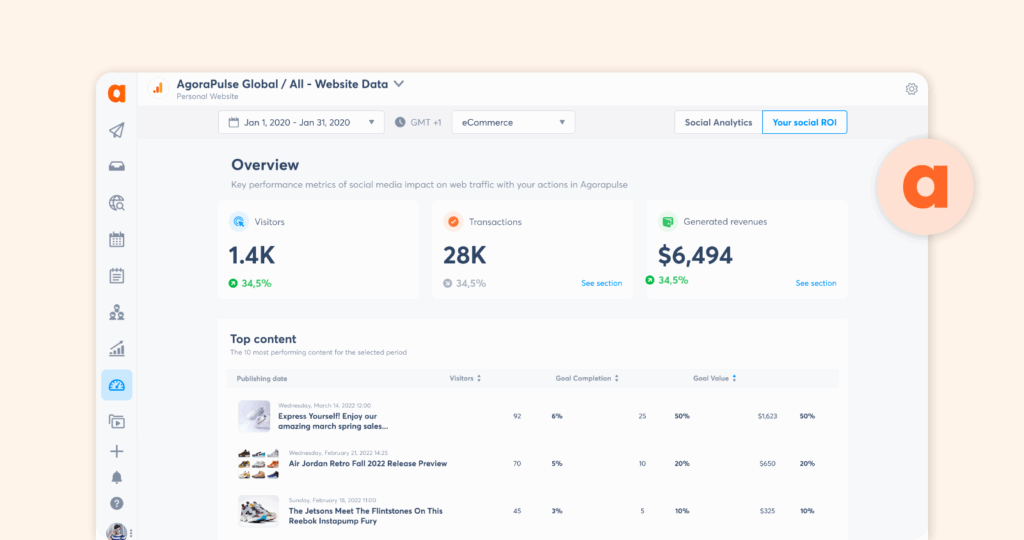
Founded in 2011 and headquartered in France, Agorapulse is a comprehensive social media management platform designed for agencies, marketers, and businesses of all sizes. It combines publishing, engagement, reporting, and team collaboration into one intuitive tool that simplifies managing multiple social channels.
When compared to Sprout Social, Agorapulse’s inbox management system, which consolidates all social interactions—comments, messages, and reviews—into a single navigate stream takes attention. This ensures no engagement slips through the cracks and helps teams respond promptly.
The platform also offers a content calendar with scheduling and queue management, robust analytics with customizable reports, and powerful competitor analysis tools. Teams can use approval workflows and role-based permissions to streamline collaboration and content review.
Agorapulse supports all major social networks, including Facebook, Twitter, Instagram, LinkedIn analytics, and YouTube, and offers white-label reports—a valuable feature for agencies delivering branded insights to clients. Pricing starts at around $79/month per user, making it an affordable yet powerful alternative to Sprout Social.
Agorapulse pricing
Agorapulse’s plans range from a free option to a fully customized Enterprise solution. The basic plans, like the Free and Standard, offer essential social media management features such as scheduled posts, social inbox, and analytics, suitable for individuals and small teams. The Professional and Advanced plans add more powerful tools including team collaboration, Instagram product tagging, content libraries, bulk publishing, and advanced analytics, designed for growing teams with more complex needs. At the top end, the Enterprise plan provides unlimited social profiles, dedicated account management, CRM integration, single sign-on, and priority support—offering a tailored solution for large organizations that require extensive customization and premium service. All paid plans include a 30-day free trial, and extra social profiles can be added for a monthly fee.
Summary: Sprout Social vs Agorapulse
Sprout Social is known for its robust analytics, comprehensive social listening, and excellent customer support. It offers an intuitive interface, strong team collaboration tools, and extensive integrations, making it ideal for medium to large businesses focused on data-driven social strategies. However, Sprout tends to be pricier, which may not suit smaller businesses or solo users.
Agorapulse, on the other hand, provides a more affordable range of plans starting with a free option, making it accessible for individuals and small teams. It shines with its user-friendly social inbox, content scheduling, and team workflow features. Agorapulse also offers solid reporting and content management features, with advanced plans that include bulk publishing.
If we consider Sociality.io alongside Sprout and Agorapulse, Sociality.io stands out for several reasons:
- It includes all the core features of Sprout and Agorapulse, such as social listening, scheduling, analytics, and team collaboration.
- Offers superior and faster customer support with more personalized assistance.
6- Alternative to Sprout Social: Hootsuite
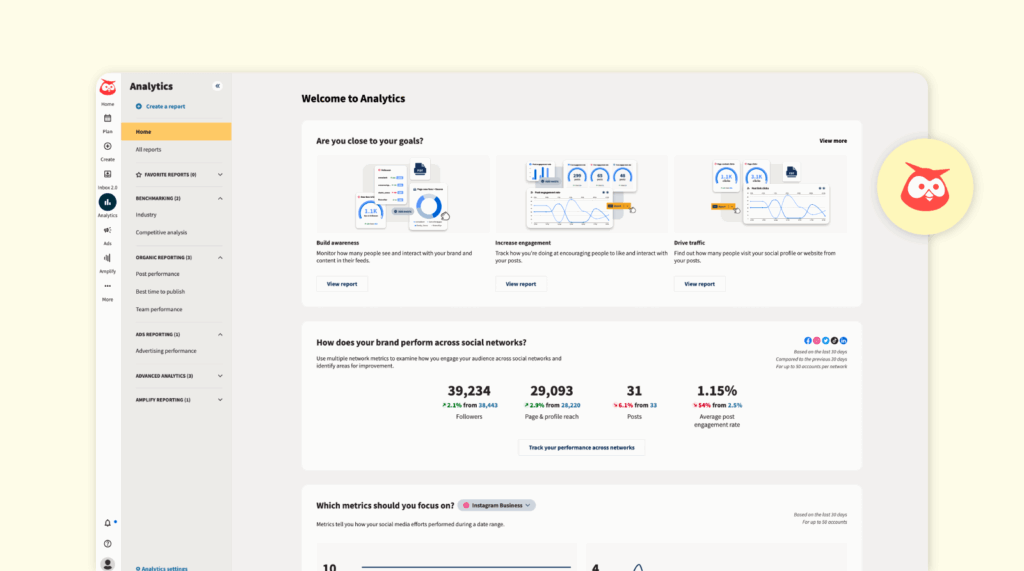
Founded in 2008 in Canada, Hootsuite is one of the first platforms that offer social media management. By using Hootsuite, you can publish, listen, analyze social media accounts and measure competitor performance. As a differentiator, Hootsuite also offers a chatbot for your website to connect you with your customers.
Hootsuite pricing
Hootsuite offers multiple plans tailored for different user counts starting from $99 to $739 — based on user counts. The most popular plan of Hootsuite is $284 per user.
Summary: Sprout vs Hootsuite
Sprout and Hootsuite have similar feature sets, but when it comes to crowded teams, Hootsuite and Sprout become very expensive as both of these companies offer pricing per seat.
BONUS: Would you like to learn about Hootsuite alternatives and how the best social media tools perform compared to it?✅
How to choose the best social media management platform?
If you’re in the market for a social media management platform, the choices can feel overwhelming. There are dozens of options — promising to help you schedule content, analyze performance, track competitors, listen to social media & web and engage with your audience. But not all tools are built equally. Here are 7 key considerations before you decide, and why Sociality.io deserves to be at the top of your list.
1. Your team size matters — Don’t overpay as you grow
Every team is different. You might be a solo content creator, a small marketing team, or a growing business where customer support, sales, and marketing all collaborate on social channels.
Many platforms charge more as your team grows, limiting access or making you upgrade tiers. Sociality.io, however, is designed with collaborative teams in mind, offering flexible plans that scale with you — without punishing you for adding more users. Whether you’re two people or twenty, you won’t have to worry about blowing your budget.
2. Your budget matters — It’s not just about the price tag
Pricing can be deceptive. A tool might look affordable at first glance, but once you add must-have features — like analytics, social inbox, approval flows, or competitor tracking — it gets expensive fast.
Some platforms offer stripped-down versions for creators or solopreneurs, but if you’re a growing team with bigger goals, you need something more powerful without entering enterprise pricing territory.
Sociality.io strikes the right balance: advanced features and pro-level tools, without the bloated cost of “all-in-one” enterprise platforms.
3. Your channels matter — not every platform treats them equally
You’re probably not just posting to one platform. From Instagram Reels to LinkedIn thought leadership to TikTok trends — every channel matters. But not every tool handles them well.
Some platforms offer only surface-level support: maybe you can post, but can’t reply to comments, track analytics properly, or manage messages across platforms.
Sociality.io gives you full control — publish, monitor, reply, analyze, and track across all major channels, with native support and no workarounds.
💡 Tip: Make a list of all the social media platforms you use today — and those you might expand to. Choose a platform that supports all of them deeply, not just technically.
4. Your support needs matter — especially when the clock’s ticking
When something breaks or you’re unsure how to use a feature, support shouldn’t be a waiting game. Unfortunately, some platforms — especially big-name ones — rely on chatbots, generic help articles, or delayed ticket systems.
With Sociality.io, users consistently praise the fast, human, and helpful support team. Whether it’s a question about a feature or an urgent issue with publishing, help is actually helpful.
5. Your feature needs matter — bells and whistles vs Real tools
Most platforms offer the basics: scheduling, basic reporting, and maybe a calendar view. But once you start needing deeper insights, collaboration workflows, ad management, or brand monitoring, the gaps start to show.
Sociality.io goes beyond the basics, offering:
- A centralized social inbox for all platforms
- Advanced analytics with exportable reports
- Competitor tracking so you’re not flying blind
- Social listening to monitor conversations that matter
- Approval workflows built for real teams, not just solo marketers
💡 Tip: Before choosing a tool, list your must-have features. Then list your “we’ll need this in 6 months” features. The best platform is the one that covers both — so you’re not forced to switch later.
6. Your workflow matters — especially for teams and agencies
Social media isn’t just about publishing anymore — it’s about planning, collaborating, approving, responding, and reporting. If your platform doesn’t support how you work, it will slow you down.
Sociality.io is built for real-world workflows: agencies working with clients, teams with multiple stakeholders, and growing companies juggling multiple brands.
Assign tasks, manage roles, request approvals, and keep everyone aligned — all in one place.
💡 Tip: During your trial, simulate your full workflow (not just post-scheduling). See if it saves you time — or adds steps.
7. Your growth matters — Don’t choose a tool you’ll outgrow
A tool might feel like a good fit now, but what about in a year? Will it support more users, more brands, more reports, deeper analytics, or new features?
Some platforms are designed for beginners — and stay that way. Others are built for growth.
Sociality.io evolves with your needs, offering scalable plans, advanced features, and constant updates. It’s a platform you can grow into, not out of.
8. Your security matters — choose the best tool to keep everything safe
In today’s digital landscape, security is more important than ever, especially for growing teams and enterprise-level companies. When selecting a social media management platform, prioritize one that offers robust security features to protect your accounts and sensitive data. Look for capabilities like strong password enforcement, mandatory two-factor authentication (2FA), session expiration policies, IP address restrictions, and detailed user activity logs. These measures help prevent unauthorized access, ensure compliance, and give you peace of mind that your social presence is secure. Choosing a platform with enterprise-grade security safeguards your organization’s reputation and keeps your social media channels safe from potential threats. Sociality.io offers all the security enhancements mentioned above! Although it’s only on the enterprise plan, it’s worth checking out.
Wrapping-up
Keep in mind where the industry is heading. With digital ads accounting for about 73% of global ad revenue in 2025 (Reuters, 2025) social media will only become more central to marketing and customer engagement. Choosing a platform that helps you manage engagement speed, scale, and automation is not just a convenience—it’s a necessity.




